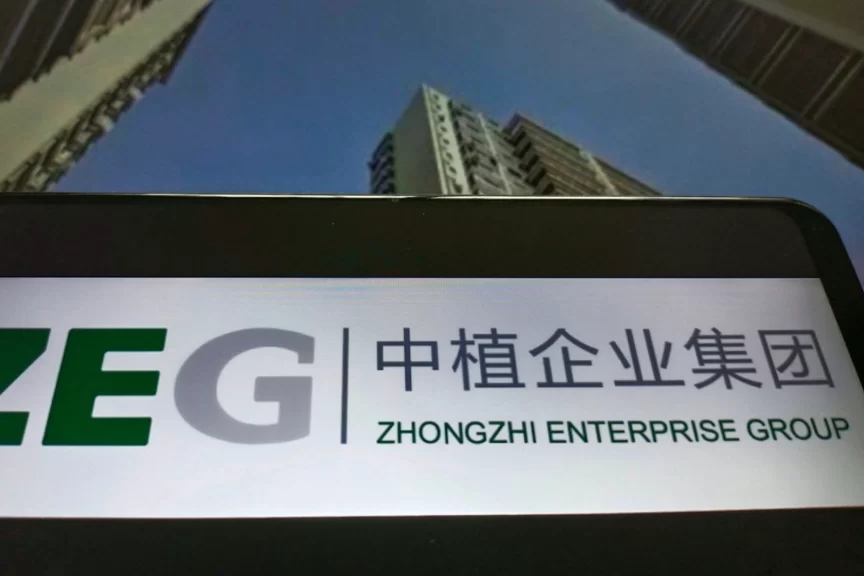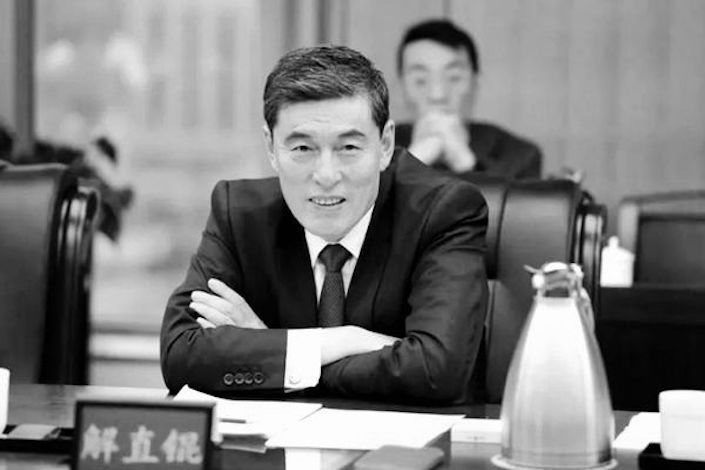Zhongzhi Enterprise Group (ZEG) was once called China’s Blackstone. With 50,000 high-net-worth investors, nearly 5,000 corporate clients, and 13,000 financial advisors, It is one of China’s largest wealth management companies. However, this financial giant has collapsed spectacularly, filing for bankruptcy at the beginning of 2024.

ZEG’s rise and fall coincides with the come-and-go of China’s economic reforms. Its founder was an enigmatic man who died suddenly two years ago, leaving his vast financial empire in disarray. Headquartered in Beijing, Zhongzhi Enterprise Group, or ZEG was known as “the rich men’s club.” Its minimum investment threshold was 3 million yuan, and the highest personal investment portfolio was reportedly at 5 billion.
ZEG provides investment products to affluent families and businesses and is a significant part of China’s shadow banking system. Shadow banks like ZEG pool family savings to offer loans and invest in real estate, stocks, bonds, and commodities. For real estate developers and local government financing platforms that can’t get bank loans, ZEG is an important alternative source of financing. However, this sector is loosely regulated, making the investments highly risky.
Who is Xie Zhikun?

Xie Zhikun was born in Heilongjiang and started working at a print factory in his twenties. When the factory became insolvent, Xie was appointed its director due to his talent. He turned the factory profitable and ventured into noodle factories, clothing factories, cement plants, and breeding farms. However, the first pot of gold that made his fortune was brokering sales of Korean pine, a rare tree species coveted for its economic value. With the wealth from the lumbar business, at the age of 34, Xie established Zhongzhi Enterprise Group (ZEG) with 50 million yuan (about 6 million U.S. dollars at the time) in 1995.
“Remove Wood, Boost Gold”
2002 was a pivotal year for Xie, both in his personal life and career. He married the renowned singer Mao Amin, one of China’s top stars at the time. His older brother, Xie Zhichun, was just appointed President of Everbright Securities in 2001. The brother maintained a low profile but possessed extensive connections, which offered opportunities for the younger Xie, who embarked on a new path in the financial industry.
To ensure his financial success, Xie Zhijun changed some characters in his name. According to the Chinese theory of “Five Elements,” metal, wood, water, fire, and earth have an interdependent and inter-restricting relationship. For example, “wood restricts metal.” The first character in his name “植” (zhí), which means “planting” implies wood. This character was unfavorable for a career in finance, which is represented by the element gold or metal. Addressing this, Xie removed the wood element from the word Zhi in his name and replaced the second character Kun with one that contains a metal element, “锟” (kūn). His name went from 解植昆 to 解直锟.
Government Relations Paid Off
ZEG’s success is attributable to its focus on relations with the local government. In 2002, ZEG collaborated with the Harbin State-owned Assets Supervision and Administration Commission and some state-owned enterprises and established the Zhongrong International Trust or ZRT. ZEG invested 120 million yuan to become the largest shareholder.
As it developed, Xie continued to leverage SOE affiliations to bolster ZEG. In 2010, he transferred 36% of the equity in ZRT to a former SOE Hengtian Group subsidiary, making ZRT essentially a state-owned entity. Xie subsequently replicated this model in four of his major wealth management companies. ( Hengtian Wealth, Xinghu Wealth, Datang Wealth, and Gaosheng Wealth.
With the backing of central and state-owned enterprises, ZEG attracted a large number of institutional clients and high-net-worth individuals. Through Xie’s singer-wife, the company brought on board many celebrity clients. Over a decade, ZRT obtained financial licenses for trust, insurance, leasing, futures, mutual funds, and private equity. ZEG also began diversifying into industries beyond finance, such as real estate, education, technology, new energy, and mining, with a portfolio of up to 37 core enterprises.
An Enigmatic Tycoon
During this time, Xie Zhikun remained exceptionally low-key. He rarely made public statements and never granted interviews. Over the years, very little was known about his personal life. His marriage to pop star Mao Amin was kept a secret for many years, earning him the reputation of one of the most enigmatic financial tycoons. However, his fate would soon change due to political changes.
In November 2012, Xi Jinping officially assumed the position of the CCP’s fifth leader. During this period, intense internal struggles occurred within the Party’s leadership. At the beginning of 2012, the then-Chongqing Public Security Bureau Chief, Wang Lijun, sought refuge in the U.S. Consulate, unfolding events that revealed a conspiracy by the Jiang faction, including Bo Xilai and Zhou Yongkang, against Xi Jinping.
Escape to Japan
Before Xi Jinping came to power, many Chinese billionaires who made their fortunes during Jiang Zemin’s and Hu Jintao’s times left China to avoid a potential political crackdown. Xie Zhikun was one of them. Wang Jizhou, a close friend of Xie and founder of Yi-he Capital, disclosed on social media that Xie took billions in funds and moved to Japan, scooping up premium assets such as hotels, hot springs, and ski resorts.
As soon as Xi Jinping assumed leadership, he initiated his famous anti-corruption campaign known as the “tiger hunt,” purging individuals associated with the Jiang faction. The Jiang faction mounted counterattacks, including the 2015 stock market crash aimed at destabilizing Xi Jinping’s power.
In June 2015, following a surge, a free fall in China’s stock markets ensued, and Xi Jinping arrested a score of prominent financial executives. It remains unclear whether Xie Zhikun participated in the financial coup. It is widely believed that as one of China’s major financial firms, ZEG’s top management was aware of the coup plan even though they might not have directly participated.
Assurance From the Top
One thing Xi Jinping and Xie Zhikun have in common is that they both married a celebrity woman. Both wives were famous singers and knew each other well. According to Wang Jizhou, after the financial coup, Xie wanted to return to China but was unsure. Xi Jinping extended an olive branch through his wife, Peng Liyuan. Peng conveyed Xi’s message to assure Xie Zhikun that he was not a target of the investigation and encouraged Xie to return to China.
Despite advice to the contrary, Xie Zhikun trusted Xi Jinping’s words and returned to Beijing in 2015. That started Mr. Xie’s nightmare. A government work team was sent to his company to track its wealth. He became increasingly despondent. Then, COVID hit, and the pandemic led to extensive lockdowns, causing the Chinese economy to decline. Xie’s companies which had grown aggressively through high leveraging, were in financial trouble.
Wang Jizhou described it like this: “There were five teapots with only three lids, and one lid even broke!” For a few years, Xie was forced to recall the details of the transactions of his trillion yuan business. This led to Xie Zhikun developing depression, and he ultimately took his own life in December 2021 at age 61. ZEG issued a statement announcing that its founder died from a heart attack.
Xie Zhikun’s death left the vast financial empire without a leader, plunging it into yet bigger turmoil. With no clear successor, uncertain ownership, and a flood of rumors in the capital market, coupled with a series of changes in top management and financial product defaults, ZEG eventually filed for bankruptcy in January 2024.
The fact that Beijing allowed ZEG to file bankruptcy while keeping the already bankrupt companies like Evergrande still in operation indicates that Beijing doesn’t care about ZEG’s demise but worries about property developers’ longevity. From the CCP leader’s perspective, ZEG’s downfall affects the affluent Chinese, who won’t go hungry after losing their investment. But ordinary homeowners who bought Evergrande properties wouldn’t be quiet if the debt-ridden developer is declared bankrupt. The social consequences would be much more serious.
In hindsight, would Xie Zhikun have been able to change his fate had he stayed in Japan? He could have only escaped his fate by cutting ties with the mainland. If he decided to leave behind his financial empire and not return, he could have lived today. As long as he was still attached to his business, Xi Jinping would have found other ways to get him. But how many people, particularly successful ones, can let go of their business, which has defined their success? So the lesson here is: don’t get attached to your achievement. Being able to let go will set you free.
Watch Lei’s full video here:






